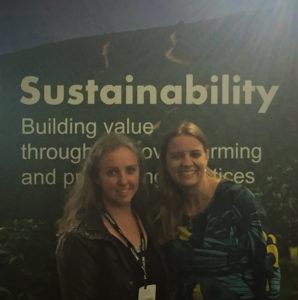Among the overused “buzzwords” in the twentieth-first century, “sustainability” may win the crowning award of repetitions.
However, as with other politically overused words, “sustainability” has a history rooted in poetry.
Sadly, this history may become lost on a generation who links sustainability with International Development, Environmental Sciences, or Agriculture.
If we return to the Oxford English Dictionary, we find that to understand ‘sustainability,’ we must first consider its origin verb, “to sustain” (literally: sub + teneo, or to hold up, to uphold).
When we do this, we learn that “sustain” is a verb with at least four original meanings: (a) “to bear, to withstand, to endure”; (b) “to defend, to support, to continue”; (c) “to provide for (especially subsistence)”; and (d) “to uphold, to hold up.”
It is very likely that this verb was first created by Chaucer, possibly used for the first time in his now-famous poem titled “Merciless Beauty”:
Your yen two wol slee me soddenly;
I may the beautee of hem not sustene,
So woundeth hit thourghout my herte kene.
And but your word wol helen hastily
My hertes wounde while that hit is grene,
Your yen two wol slee me soddenly;
I may the beautee of hem not sustene.”
The poem is a rondel, or a song that carries its music through three song cycles that repeat in a specific pattern.
Chaucer’s Middle English poem has been translated dozens of times into contemporary English, but for our purposes, a more literal translation may suffice: “Your two eyes will slay me suddenly / The beauty of them, I may not sustain.”
Chaucer may have simply needed a new word to use for his alliteration with “slay me suddenly” or perhaps he just wanted to create a new word (Chaucer created many new English words that appear for the first time in his Canterbury Tales).
But whatever his original motive, the fact that the first appearance of “sustain” is linked to beauty, feels particularly poignant to me during our twentieth-first century’s focus on its future legacy. Yet, is not beauty the foundation for such a desire in the first place?
Philosopher and author Elaine Scarry asserts that “beauty always takes place in the particular”; cruelty uses abstractions. (Her book, On Beauty and Being Just, is a thing of beauty itself, as she critiques many political objections and prosaic protests against the power of beauty.)
For sustainability to really be effective, perhaps we need a return to paying attention to the particular. Perhaps a focus on truth and goodness would bring us joy. And perhaps that joy would lead to beauty, which then might just become truly sustainable in ways we have yet to imagine.

Laura Elphick & Erika Koss at SCA Expo, Boston 2019